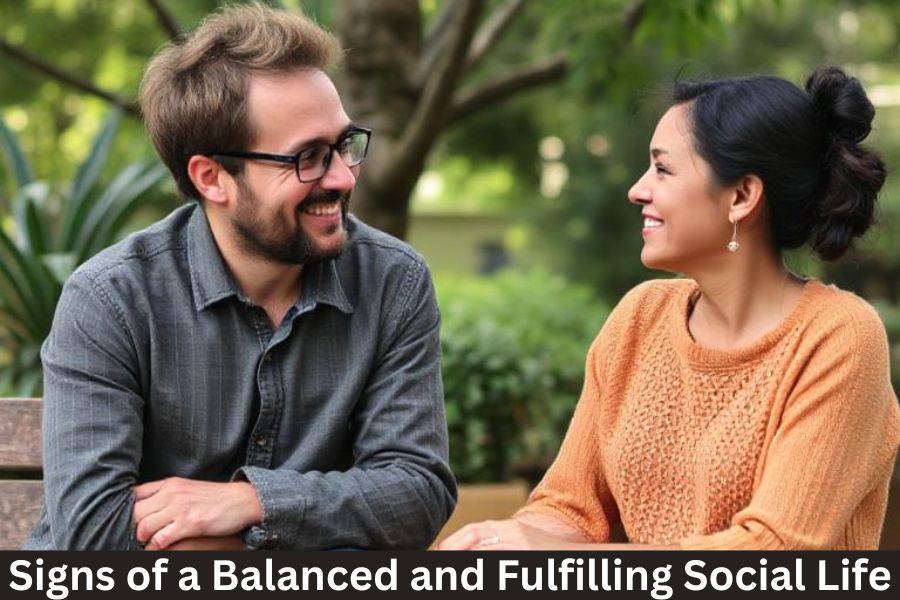Areocial life that’s balanced and fulfilling is one of the main pillars of overall health. But, what exactly does a balanced social life look like? How would one know if they possessed it? Is it just about having many friends, or is there more to it? We will look into the essential signs of a balanced and fulfilling social life and provide insights into the mixture of relationships, boundaries, and time for personal affairs.
What Is Considered to Be a Fulfilling Social Life?
It really boils down to the nature of your interactions rather than how many people you view as friends or how many social events you attend. It means a network of truly deep connections, or in other words, setting boundaries and recognizing when to prioritize your own space. If you have a balanced social life, you feel energized, connected, and supported emotionally; you do not have to trade your mental and physical health darts.
Let’s explore some of the signs that point out your life is headed down the right track socially.
Understanding Social Life Balance
The Concept of Balance in Social Interactions
A balanced life revolves around social activities and alone time. One spends time in social settings and attends to friendships but, on the other side, carves out enough time for an “I-do-my-own-things” agenda. An imbalanced life implies being overwhelmed with social commitments or sitting by yourself the whole day.
Socializing vs. Overcommitting
It’s crucial to differentiate between positive social interactions and having too many engagements. The latter leads to burnout and feelings of resentment, while the former strengthens your bond with others, lift your spirits, and nurture your emotional well-being.
Indicators of a Well-Balanced Social Life
1. Healthy Boundaries
Know When it Is Okay To Say “No.”
The first indicator of a balanced social life is the ability to establish healthy boundaries, which means saying “no” when such should be done. It reduces expecting guilt and being resentful about protecting your time, energy, and mental capacity.
Saying “No” Is Good for Your Mental Health
Such commitments bunch up frustration, anxiety, or burnout. Saying yes to no keeps your chill time intact, focusing on what matters most. Healthy boundaries keep social life good quality, and you end up well balanced emotionally and physically.
2. Meaningful Relationships Over Superficial Friendships
The Power of Meaningful Relationships
A social life that is balanced is one that builds on meaningful bonds. Instead of flooding your life with acquaintances, give priority to cultivating a few deep and trustworthy relationships. These are the people who support you, challenge you, and grow with you.
Build Trust and Sustainable Emotional Support
In healthy social interactions, trust and mutual support lay the foundation. These meaningful relationships act as emotional security, allowing you to build confidence and resilient spirit so that you can effectively deal with life-related challenges.
3. Emotional Balance of Social Interactions
Energizing, Exhausting
An important sign that your social life is balanced is that your social engagements energize rather than exhaust you. After interacting with friends or family, you should feel uplifted and rejuvenated rather than tired or overwhelmed.
Navigating Conflict in Healthy Ways
A balanced social life lets you address conflicts maturely and respectfully. Emotional balance suggests disagreements don’t devolve into ireful attacks; opposing views can be constructively expressed and resolved.
4. Good Alone Time Is Necessary
Why Alone Time Is Necessary for Personal Growth
Even the most social people need time to be alone. Alone time is not about isolation; it’s about creating space to reflect, recharge, and pursue personal interests. This time helps you reconnect with yourself, improving your mental clarity and emotional health.
Balancing Social and Alone Time
Balancing social time with alone time is crucial. Too much social activity may lead to burnout, while too much alone time may foster loneliness. Keeping a good balance will ensure a fulfilling and sustainable social life.
5. Diversify Your Social Circles
Diversity in Social Life Provides Enrichment
Balanced social life stands for diversity. Meeting people from all walks of life, culture, and different experiences serves to broaden your horizons in person. It’s about learning, developing, and doing new things, all of which are fundamental in personality development.
Get to Know People from Different Backgrounds
Having a diverse group of friends spypesupajícízatázku. Different views give you insight into looking upon life in new ways that help both with personal growth and social life.
6. Decrease Time on Social Media
Less Screen Time Equals More Real-Life Connection
In today’s digital world, it’s easy for the virtual world to be mistaken for the real one. However, a balanced social life emphasizes face-to-face communication over virtual communication too much. Spending too much time on social media can leave one feeling isolated or disconnected from the offline world.
Social Media Detox for Mental Clarity
Reducing screen time would be great for mental clarity and focusing on more meaningful in-person connections. Social media detox will make you appreciate your surroundings and the people that matter most.
7. Feeling of Belonging
Importance of Feeling Accepted and Loved
The feeling of belonging related to your relationships is an important indicator of a balanced social life. Being part of a community that supports you, whether it be family, friends, or workmates, assures you that you belong and are valued. This sense of acceptance also provides for your emotional security, which ultimately strengthens your presence in the world.
How a Feeling of Belonging Strengthens the Social Environment
When you feel accepted and loved, you tend to become highly engaged in social interactions. The end result is a strong emotional bond that supports you through life challenges.
Practical Techniques to Rebalance Your Social Life
Some Practical Steps to Alter Your Social Life
To make your social life more balanced, start by:
- Setting clear boundaries with friends and family.
- Prioritizing quality over quantity of your social connections.
- Making room for self-care and self-development.
- Assessing your current relationships and making the necessary changes to your social circle.
- Assessing and Adjusting Your Current Social Dynamics
Evaluate your social life periodically to find out whether it fulfills your emotional and mental needs. Are your social engagements rewarding? Do they make you feel energized and supported? If the answer to any of these questions is ‘No,’ then it is time for you to make some adjustments and create a balance between your social commitments and private time.
Conclusion
One’s social life is a balanced and fulfilling one not by having an endless string of official engagements. Instead, it is about the necessary stationing of meaningful human relationships, healthy boundary-setting, and time to reflect, recharge, and grow. When in balance, your social life becomes a great contributor to your own well-being and personal, emotional growth.
FAQs
1. What are the signs of a healthy social life?
Healthy social life means meaningful connections, setting boundaries, emotional balance. After socializing, you should feel energized, not incontinent and have time to be by yourself.
2. How do I know if my social life is balanced?
You lead a balanced social life if you are always able to fulfill social commitments without feeling overwhelmed. You then value good quality relationships, set limits for yourself, and find time for caring for yourself.
3. Why is alone time important in social life?
It comes in handy for personal reflection and for recharging your energy. Alone time creates opportunities for your growth and makes your social interaction-even more fulfilling.
4. How do I build more meaningful relationships?
Emphasize quality over quantity. Spend your valuable time bonding with people that reciprocate your values; carry on with them in deep conversations, and richly nurture every relationship with care and respect.
5. Does social media destroy social life?
Social media, in its overuse, builds wall of disconnection and lead one to a lonely state while interacting online. Therefore, limiting screen time and emphasizing real life relationships go a long way in balancing social life.




